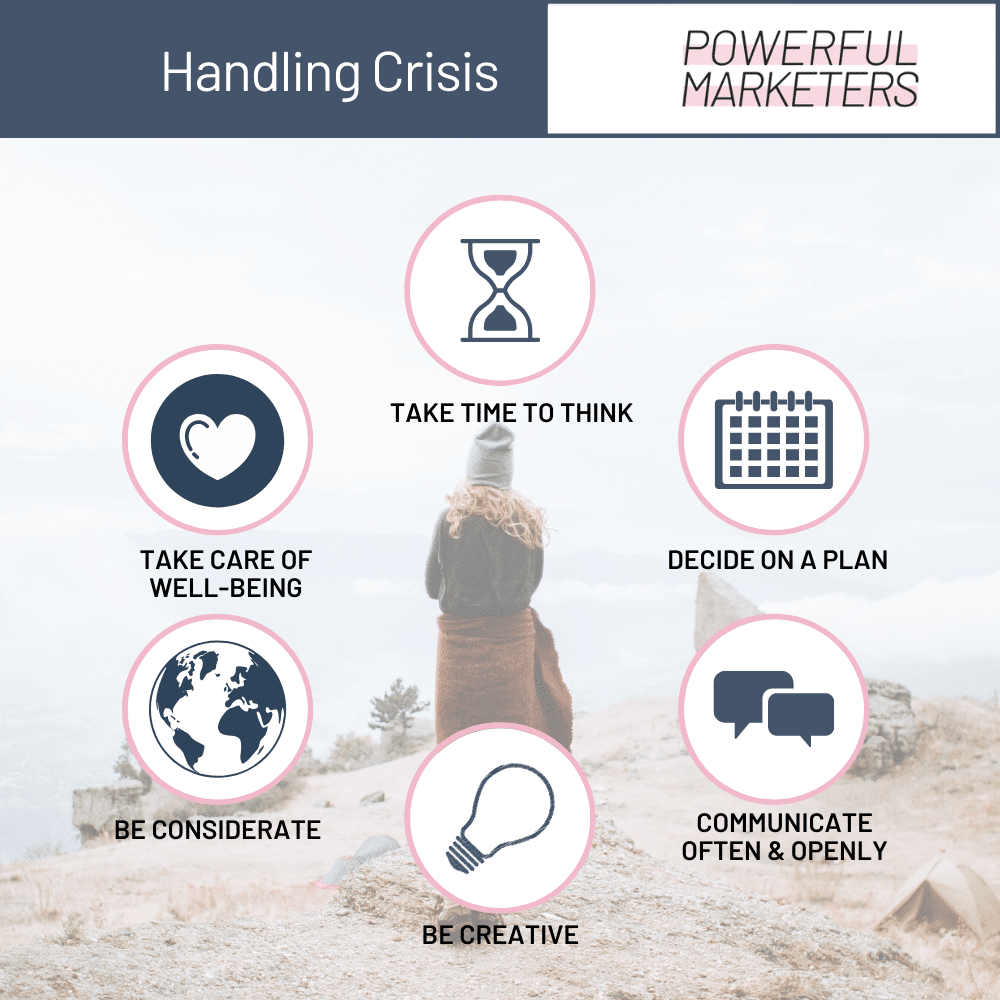How quickly have our lives been changed due to the rapid spread of the coronavirus (COVID-19). People are affected by it all over the world. It is too early to speculate over the extent to which the global economy will collapse. However, the fact is that it will collapse. This new period of life is challenging for everybody, as the way in which life is organized is changing in all sectors.
- Should you quietly wait and observe what’s going to happen?
- Should you be proactive or try to escape?
- Will acting in times of crisis bring you success?
- How to manage your employees, your strategic partners, and your business’ reputation during this this global crisis?
- What could help ensure survival?
These and many other questions are on the agenda at the same time for many entrepreneurs and professionals… As long as there are no definite answers, it is important to focus on what is possible. Right now, no one knows yet what the new normality will be, but here are some thoughts for marketers and entrepreneurs regarding marketing and communication to help you navigate these troubled waters and survive.
1. Clear and coherent communication inside and outside the organization
In crisis, it is not important what type of business you are in. Everything comes down to people. You need to think about how to communicate what is happening in the coming days, weeks and months to both internal and external clients. During the first days of the crisis, you may get away with remaining silent or being chaotic, but after that, people need definite information. If you do not communicate properly internally, then employees will be left anxiously in the dark and they will start to guess and try to figure out the next steps by themselves.
In a major crisis, it is crucial to communicate with the balancing principle. That means, if there is an extreme, serious, harsh, new and scary message on the one hand, then on the other hand you need a simple, clear, familiar and secure explanation of what is good.
Definitely no one should be criticized in a crisis for the way they react to the crisis, because there are always over- and under-responders. The job of marketing and communication is to repeat a simple and clear message consistently through various channels to create a sense of security for all.
Crisis communication must be in place and repeated to people. You should also create a simple A4 paper with the most important points on them, and put it where everybody can see them (on the office wall, or in the case of self-quarantine, in the internal communication systems). This way, people automatically know what needs to be done in a crisis situation.
Remember that everybody needs the information:
- Customers (certainly your existing ones, but also the potential new ones, so choose the channels accordingly),
- Co-operation partners & service providers,
- Your employees,
- Other critical people involved in your business.
Times are hectic and you have to quench anxiety with adequate communication: there are people afraid of losing their health, their money, their job, access to essential products and services, etc.
2. Lead emotions
Crises always occur in life. The really big ones can break even the strongest people. Mostly, this is due to the flood of emotions from enduring exhaustion and uncertainty and frighteningly profound changes that at one point can no longer be managed. Therefore it is crucial that you work on your mental strength when times are good and practice taking every distressing emotion as an opportunity or a lesson. This habit will really help you during crisis.
- Emotions are natural and are not subject to commands and prohibitions. Rather, emotions tend to subside when they are accepted, when you focus on facts, and take time to process. So hurry slowly.
- At meetings, ask questions about how to solve the situation. This drives solution-oriented rather than problem-oriented thinking.
- Don’t consume all the news 24/7 and then overthink, instead remain on top of crucial information and monitor what’s most important to your business, including your overall situation. Use only sources that you trust to gather information. Control what you control and don’t focus on things you can’t change.
- Before making a decision, ask yourself and the person you are going to for advice whether you both really know or think you know what determines the content of the decision. If that knowledge is not verifiable, consider your decision more carefully.
- There are no days off in crisis, but you must take them. You need a clear and rested head to make decisions. Every work day in times of crisis, aim for the 3 most important things that need to be done. Plan a time to deal with unexpected emergencies, as well as a time for you to really take a break and shutdown for a while. Do not overload, otherwise fatigue and anxiety will cause additional stress.
- Support yourself with following a routine and use time planning as much as possible. Unexpectencies need to be addressed right away, and other important things can be planned. Formulate important activities you control for each day, week, or month – set important dates and keep them in mind. Help yourself by distinguishing between what is essential, necessary, delegable, irrelevant. Use the most convenient assistant for you – a calendar, notes, alarm clock or other reminder.
Here’s a quick graph showing how you can help lead your emotions and yourself in crisis:

3. Support collaboration & creativity
The word crisis means danger in Greek, but it also signifies a turning point and an opportunity. Every crisis causes people to re-evaluate and see new opportunities. In addition to seeing opportunities, they also need to be realized. The biggest obstacle is the force of habit, for example, if you are used to mobilizing only in an employer-organized environment. The much-talked-about home office work situation takes on a new dimension when the entire company can move into remote work. This is a challenge for all parties. At the same time, the focus is on self-discipline, adherence to agreements, work efficiency, as well as timely shutdown from work.
The new situation is a good basis for new ideas. You should consider the following:
- Should you and can you change your business so that you can offer products and services virtually?
- What do customers expect most now?
- What can be done to make both external and internal clients feel secure?
- To what extent and if at all should you use advertising?
When answering the last question, be aware that a lot depends on the product / service and be especially careful with products that are somehow taking advantage of the crisis. If your product / service is secondary to meeting people’s needs, it is often wiser to “not party during the plague”. Rather, put these things on hold until the situation stabilizes.
Remember, change is the only constant in the world and everyone who can adapt will survive. At the same time, every person needs their Ikigai, as the Japanese say, meaning the reason of being. That is why collaborating across the enterprise is particularly important in the crisis to find creative solutions. As a leader, make sure that all your people – sales and marketing, manufacturing / service and staff / training, cleaners and guards – are all seen and involved and have implemented collaborative solutions.

4. Threats in marketing during crisis
- Scammers. In times of crisis, creativity starts to work for everyone, including for example, a number of fraudulent entrepreneurs who exploit people’s fears. The only way to stand out is to be transparent and honest and caring. If necessary, make videos and show that you are real and out there. For example, now that the share of e-commerce has increased many times, people have to be very careful about where and on what they spend their money.
- Doing nothing. Being a spectator during crisis does not make you reliable. Don’t get lost, don’t leave unanswered questions! Prevent them and solve people’s problems at every level! Because people are really in trouble, and when all is over, your customers will remember and appreciate you because you did not hide your head in the sand and did not disappear for them in difficult times.
- Making jokes about the crisis. Humor is very much needed to relieve some tension, but it is not appropriate in crisis. People close to you may come to terms with the black humor, but a little stranger’s joke can cause a wound that may not be patched. Let humor and satire stay in a more relaxed period.
- Pushing sales excessively. People are having a difficult time, everyone is anxious, and now is not the time to make aggressive sales. In emotional moments, we can all make irrational decisions that we regret later, and a responsible company does not “push” during a crisis. Your first goal must be to help people and to maintain a relationship with your target audience – only sell and market through that. Perhaps this crisis is also a new opportunity for your business and you even have to think of a new strategy, product or service?
- Judgements and criticism. These are the dangers of marketing and communication (no matter who or where) at any given moment, but in times of crisis, you have to keep a very close eye on it as criticism can create new crises. Criticism automatically calls for a defensive position, which precludes cooperation. Only in dialogue can it be debated whether the critical appraisal is directed towards change, not just finger pointing. Unfortunately, in most cases, the crisis does not have the necessary extra time. The disagreement in the crisis must be formulated, but without judgements, so that an alternative stance can be taken taken instead of blaming.
5. Have and follow a crisis plan
In a real crisis situation, you truly understand the importance of a crisis plan. If you have not had one so far, then this crisis will be the basis for your future crisis’ plans, as each successive crisis is easier to pass through by knowing the first step already. In any case, the plan should be reviewed annually and adjusted as necessary. However, the plan itself may be a set of general principles on no more than 3 pages, but the annexes to the plan are case-by-case guidelines and supporting so-called skeleton plans. Thus, a good crisis plan is like English law, which will never be completed, and each new case will receive a refinement of a new annex or an earlier annex.
In any crisis, it is necessary to inform the key people with authority, presumably the members of the crisis team, of their role in this crisis, which would cover all the threats. Doing that is easy when you have a plan in place. Each member of the team has a responsibility to keep an activity log up to date and time, so that the leader’s question can be answered in an unmistakable way, and also so that the actions can be further analyzed after the crisis. As an authority manager, you know what areas need to be covered to prevent disaster within the authority. Do not forget that the so-called soft sphere cannot be put on hold.
There are no insignificant areas of the crisis, so make sure the following is addressed:
- Focus on the short-term plan until the situation stabilizes. What matters today is daily crisis management and delivering clear, peaceful messages! If you are not already, then start having daily and weekly follow-up meetings.This is a quick conversation, situation assessment and tasks sharing process that makes sure all the team members are on the same page. This includes information:
- What and to whom and how we communicate (crisis marketing = adequate communication!),
- What is happening inside the company.
- What are the most crucial things and priorities to focus on.
- Strategies and long-term plans, as well as campaigns that emphasize secondary needs (i.e. not related to building the sense of security that is most important in a crisis) should be put on hold. The golden rule of psychology (to be used in marketing in times of crisis) is always to remember the Maslow’s Hierarchy of Needs. If the lower (basic) needs are not met, the higher needs lose their importance.
- Advertising depends on what business you are in. You can certainly continue with it, but be very cautious with crisis-related messages (secondary needs are not relevant to the crisis, rather basic needs and building a sense of security!). Remember what people are looking for – this will give you answers about what to advertise and what not. (Maslow’s Hierarchy of Needs!)
- Communication and information sharing are the best weapons you can have! All your public channels need to be covered with initial information (think again about the internal and external clients, new and existing customers, partners, etc.). People need answers to the following questions: WHO, WHERE, HOW, WHAT, WHY, WHEN. Share what’s happening, where the answers can be found, whether and how the company is open during a crisis, etc. Also review all automated processes and make sure the content remains appropriate in the context of crisis.
- Observe: Listen, observe, and measure reactions. Monitor what’s happening to understand how people respond to the crisis and how your followers are responding to it in mainstream and social media. The impact is different for different types of businesses. This may be the key to understanding and gaining control over the negative situation.
- Involve experts. In a crisis it becomes clear how necessary a neutral expert is in the context of marketing or interpreting human behavior. Society is very much in favor of understanding the company at the individual level. If necessary, include experts who know the profile of your institution, who you know, because the expert’s comment sounds convincing and reassures your target audience that everything has been seen and kept. Use your marketing partner, psychological counselor, etc., which you may rarely need on a daily basis.
- Leaders need to communicate with the public. Make sure that company executives and / or owners are the ones who give a safe and reassuring message about how the company operates. Because they have the power to make decisions, their messages always have a greater impact. It is necessary to decide which of the leaders is the spokesperson for the media so that other leaders can deal with survival. Normally known as good communicators, public relations professionals and spokespersons can do the groundwork needed for a CEO, but they do not deliver important messages in a crisis. It is said that the king speaks rarely, but if he does, then things are spoken.
- Put collaboration & co-creation in honor.
- Involve key people across the business and put a plan together
- Involve employees, communities, etc. to find solutions and brainstorm. The greatest power is in working and thinking together! Don’t be afraid to involve your employees, clients, partners in discussions! The authenticity of your business will only bring customers closer to you!

Marketers, don’t be afraid to take responsibility. This is your chance to act, show willingness, and learn to grow. A very exciting new era is here, don’t miss this opportunity for growth. If you are empathetic and transparent as a person and a company in a crisis, you will be honored and thanked! If you are afraid, say it too, and if you do not know the right answers, say it too. But be open to solutions, communication and feedback!
Have common sense. Nature’s laws are in place and the planet Earth can stand up for itself. Now stand for yourself and for the marketing of your business in the same way as the laws of nature. The most important thing is to look at your product-service through the eyes of the customer, and at the moment also through the fears of the customer! Anything superfluous becomes irrelevant, and those who truly provide value and help to people, whether in terms of products or services or just clear and secure communication, gain strength.
The global coronavirus pandemic has thrown all of humanity into a new era and this is the time for rethinking. Be a leader and don’t miss the opportunity to grow your business. The crisis is always, among other things, an opportunity. History has shown that those who act in a crisis, in a solution-oriented and caring way, emerge from the crisis much stronger, whatever the changes.
#marketers #crisis #plan #positivity #quarantine #thoughts #coronavirus #psychology #marketing #business #economy #crisisplan #together